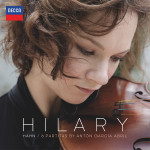|
Back
05/20/2019
Antón García Abril: 6 Partitas for Violin Solo
Hilary Hahn (violin)
Recording: Unknown – 60:13
Decca 00028948348329 (Distributed by Universal Music Group) – No booklet

   
Hilary Hahn is surely one of the greatest violinists before the public today, presenting a seemingly effortless combination of virtuosity and expressive depth, and so her latest recorded release is noteworthy if only because it represents her first personal commission of a set of works, rather than an isolated movement, from a single composer, namely Antón García Abril. The Spanish composer (born 1933) worked closely with Hahn in creating these pieces and tried to make each reflect a distinct facet of her musical personality—hence the almost painfully banal titles appended to each of the 6 Partitas, which spell out HILARY in acrostic: Heart, Immensity, Love, Art, Reflective, You. As saccharine as this seems, no sentimental neo-Romanticism is on the musical table here. While largely eschewing the trick-bag of showy technical gimmicks that seemingly dominates so much contemporary chamber music—indeed, the music is conceived in firmly linear terms—the idiom is basically a modern one; not quite as melodic as Hindemith, perhaps (which is to say hardly melodic at all), yet generally less abrasive than Bartók. Although I was initially intrigued by Love, which Decca has been using to promote this set online, hearing the entire set leads me to believe that this limits the evocative power the music purports to convey. There is little of what I suspect most would recognize as “heart” in the first partita, for instance.
However, Abril clearly did take some trouble to differentiate the movements by character, albeit not in a way that consistently bears out their titles, to my ears at least. Immensity and Reflective, for instance, have elements of scherzos, and the latter—playful and driving by turns, with lots of slithering slides and some nearly dazzling trills—furthermore strikes me as in some ways the most interesting of the set. Yet what is most distinctive about the set as a whole may be the composer’s use of counterpoint. Rather than following Bach’s model in giving us a lot of implied polyphony (where only one voice can be heard distinctly in a given measure, generally, but in such a way that the ear can “fill in” the progression of another contrapuntal voice), Abril likes to write closely overlapping lines with just enough rhythmic independence to emerge as distinct voices. Thus the texture often feels more homophonic than polyphonic, although frequently a single note is held against a more complex phrase in the other voice. Not surprisingly, Hahn seems utterly unfazed by the technical challenge here; indeed she attacks it with gusto, yet not at the expense of poise.
I was enthusiastic about this premiere recording and regret not enjoying it more than I did. But in spite of some incidents of harmonic interest, not to mention Hahn’s palpable virtuosity, the almost complete lack of charm kept me from being wholly drawn in. Abril is clearly a gifted and serious composer; if only he had shown here the courage to buck the conventional wisdom that expressive melody and structural rigor can no longer coexist in a single work.
Samuel Wigutow
|